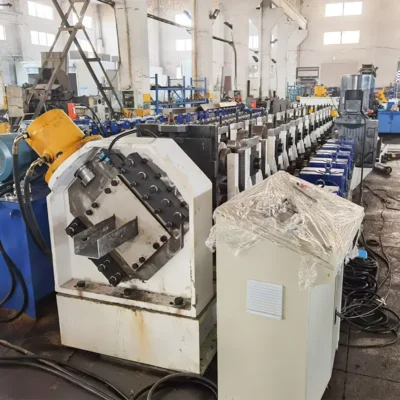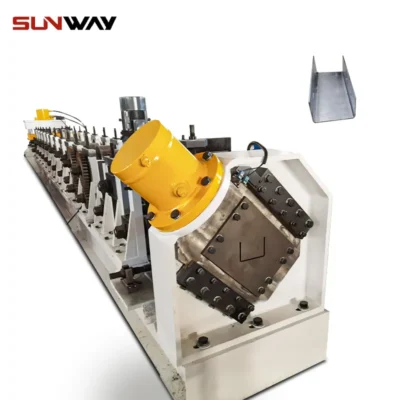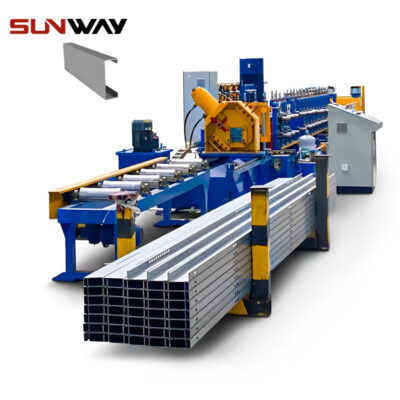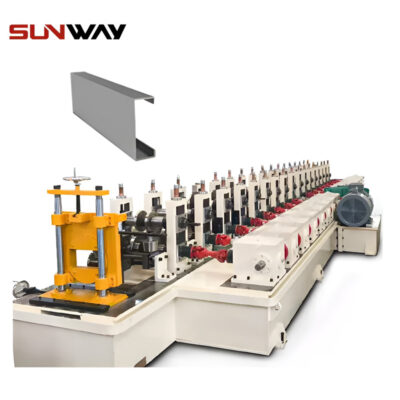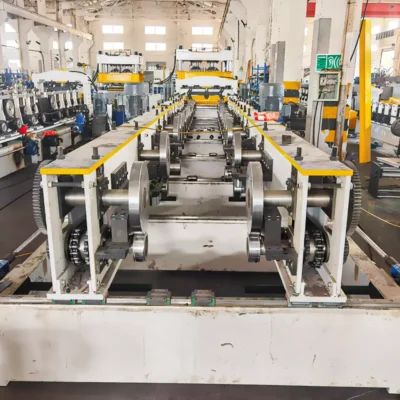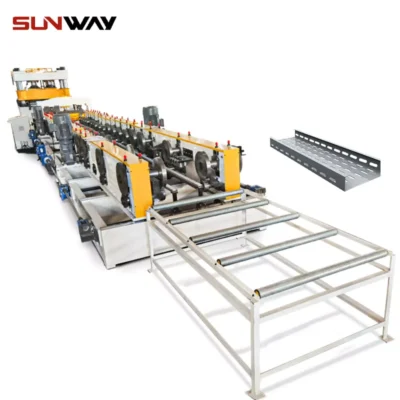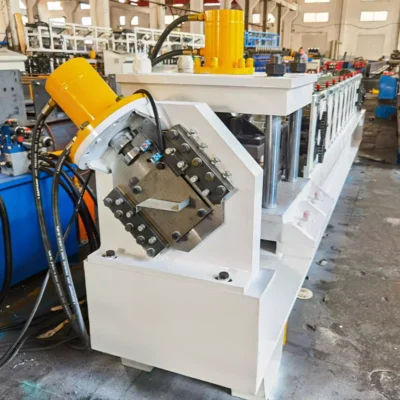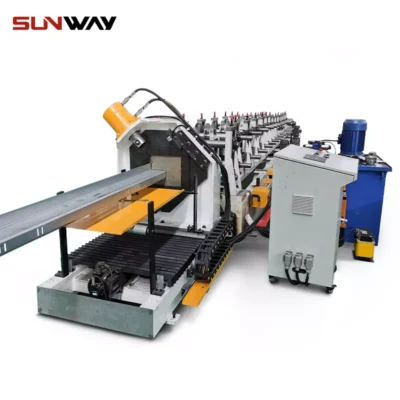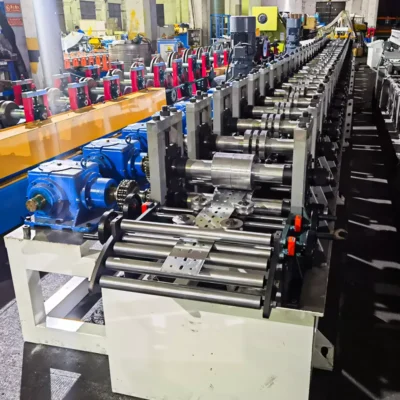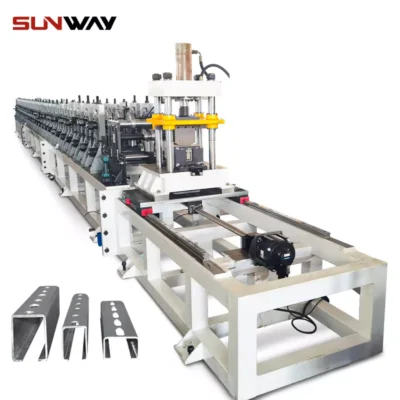When it comes to healthcare, precision, durability, and efficiency are paramount—especially for hospital beds, which serve as a critical component in patient care. From adjustable frames to reinforced structures, hospital bed frames must meet rigorous standards for strength, ergonomics, and safety. Behind the scenes, Hospital Bed Frame Roll Forming Machines play a pivotal role in manufacturing these essential components, enabling healthcare providers to deliver comfort and care without compromise.
These machines are designed to produce high-quality, customizable profiles for hospital bed frames quickly and efficiently. By shaping raw materials like galvanized steel or aluminum into precise structural components, Hospital Bed Frame Roll Forming Machines empower manufacturers to meet growing demand while ensuring compliance with international healthcare standards.
In this comprehensive guide, we’ll explore the applications, features, production process, pricing, technological advancements, and market trends of these machines. We’ll also discuss why Wuxi Sunway Machinery is the leader in roll-forming technology for healthcare manufacturing.
What is a Hospital Bed Frame Roll Forming Machine?
ক Hospital Bed Frame Roll Forming Machine is a specialized industrial system designed to produce the structural profiles used in hospital bed frames. These profiles include the side rails, crossbars, support beams, and head/foot panels that make up the bed’s frame.
The machine processes raw materials—typically galvanized steel, stainless steel, or aluminum—and passes them through a series of rollers that incrementally shape the material into precise profiles. With integrated punching, cutting, and embossing systems, these machines ensure that every component meets the high standards required for medical environments.
Applications of Hospital Bed Frame Roll Forming Machines
Hospital bed frames are a vital part of the healthcare infrastructure, supporting patient recovery and medical procedures. The components produced by these machines are used in a variety of applications, including:
1. Standard Hospital Beds
- Use Case: Producing durable frames for general-purpose hospital beds used in wards and patient rooms.
- Why It Matters: Ensures strength and stability for daily use, accommodating patients of varying weights.
2. ICU Beds
- Use Case: Frames for intensive care unit (ICU) beds with advanced functionality, such as motorized adjustments.
- Why It’s Crucial: Supports critical care by enabling ergonomic positioning and robust weight capacity.
3. Adjustable Beds
- Use Case: Frames for beds with adjustable head, foot, and height sections, often used in long-term care facilities.
- Why It’s Important: Enhances patient comfort and facilitates easier access for caregivers.
4. Pediatric Beds
- Use Case: Lightweight frames for hospital beds designed specifically for children.
- Why It’s Relevant: Provides safety features like enclosed side rails while maintaining a child-friendly design.
5. Bariatric Beds
- Use Case: Frames for heavy-duty beds designed to accommodate bariatric patients.
- Why It’s Essential: Ensures structural integrity and durability for higher weight capacities.
6. Surgical and Recovery Beds
- Use Case: Frames for specialized beds used in operating rooms and post-operative recovery units.
- Why It’s Useful: Offers precision engineering to support surgical positioning and patient recovery.
7. Homecare Beds
- Use Case: Lightweight and portable frames for beds used in home healthcare settings.
- Why It’s Exciting: Combines durability with ease of assembly for convenient use in non-hospital environments.
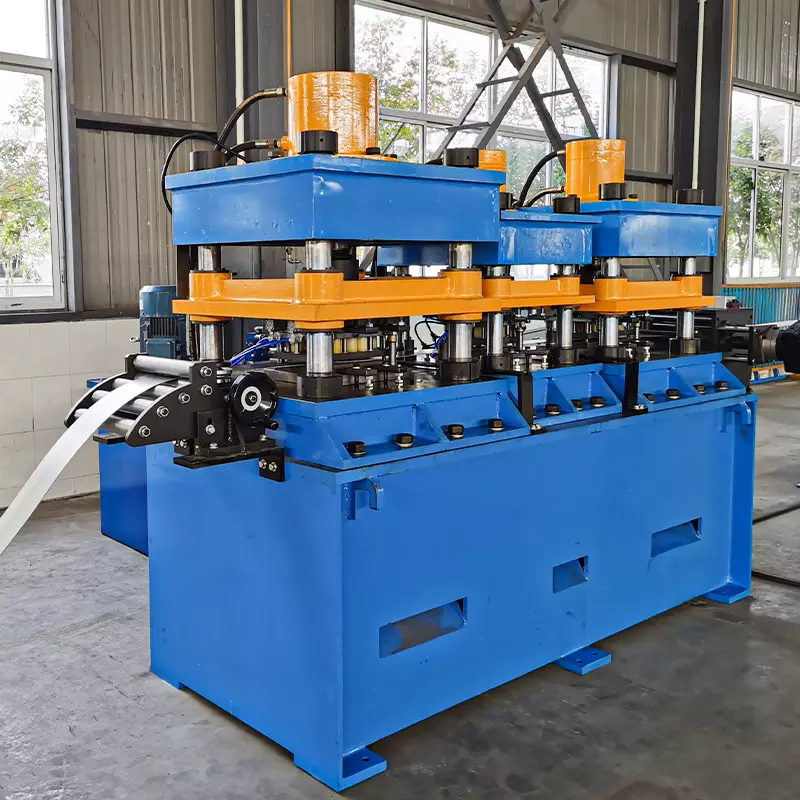
Key Features of Wuxi Sunway Hospital Bed Frame Roll Forming Machines
Wuxi Sunway Machinery is a global leader in roll-forming solutions, offering machines tailored to the specific needs of the healthcare industry. Their Hospital Bed Frame Roll Forming Machines are equipped with state-of-the-art features to ensure efficiency, precision, and compliance with medical standards.
1. High-Quality Material Compatibility
- Supported Materials:
- Galvanized steel
- Stainless steel
- Aluminum alloys
- Why It Matters: Ensures the production of corrosion-resistant components that can withstand frequent cleaning and disinfection.
2. Multi-Profile Production Capability
- What It Supports: Machines can produce various profiles, including side rails, crossbars, and head/foot panels.
- Why It’s Beneficial: Allows manufacturers to create complete bed frames with a single machine.
3. Integrated Punching and Embossing
- What It Offers: Built-in systems for punching holes, creating slots, and embossing patterns or logos.
- Why It’s Revolutionary:
- Reduces the need for secondary operations.
- Ensures precision for easy assembly.
- Supports branding with embossed logos or product codes.
4. High-Speed Production
- Performance: Capable of producing up to 30 meters of profiles per minute, depending on material and design complexity.
- Why It’s Relevant: Meets the high-volume demands of healthcare equipment manufacturers.
5. Customizable Tooling
- What It Allows: Quick-change tooling systems for creating custom profiles tailored to specific bed frame designs.
- Why It’s Essential: Supports flexibility for manufacturers serving diverse healthcare markets.
6. IoT and Automation Integration
- What It Provides: Real-time monitoring, data collection, and automated adjustments through IoT-enabled sensors.
- Why It’s Critical:
- Enhances production efficiency.
- Minimizes errors and material waste.
- Enables predictive maintenance to avoid downtime.
7. Hygiene and Safety Compliance
- What It Ensures: Machines are designed to process materials and finishes that meet medical hygiene and safety standards.
- Why It Matters: Ensures components are easy to clean and resistant to bacteria, aligning with healthcare regulations.
Production Workflow of a Hospital Bed Frame Roll Forming Machine
The production process for hospital bed frame components is designed to be efficient, scalable, and precise. Here’s an overview of the workflow:
1. Material Loading
- Raw metal coils are loaded onto the machine’s decoiler, which feeds the material into the rollers.
2. Leveling
- A leveling system ensures the material is flat and free of defects before entering the roll-forming section.
3. Roll Forming
- The material passes through a series of rollers that shape it into the desired profile incrementally.
4. Punching and Embossing
- Integrated systems create holes, slots, and embossed patterns required for assembly and branding.
5. Cutting to Length
- Profiles are cut to the required lengths with high precision using hydraulic or laser systems.
6. Quality Inspection
- Each profile is inspected for dimensional accuracy and compliance with healthcare standards.
7. Stacking and Packaging
- Finished profiles are stacked and prepared for transportation to the assembly line or storage.
Pricing of Hospital Bed Frame Roll Forming Machines
The cost of a Hospital Bed Frame Roll Forming Machine depends on its features, production capacity, and customization options. Below is a general pricing guide for 2025:
| Machine Type | Capabilities | Price Range (USD) |
|---|---|---|
| Standard Machines | Basic profile production | $150,000–$250,000 |
| Advanced Machines | High-speed and multi-profile output | $250,000–$400,000 |
| কাস্টমাইজযোগ্য মেশিনসমূহ | Including punching, IoT, and automation | $400,000–$600,000 |
For detailed pricing and financing options, contact Wuxi Sunway Machinery.
Market Trends for Hospital Bed Frame Roll Forming Machines in 2025
The demand for Hospital Bed Frame Roll Forming Machines is growing rapidly due to advancements in healthcare infrastructure and an aging global population. Key trends include:
1. Growth in Healthcare Infrastructure
- The Trend: Expansion of hospitals, clinics, and long-term care facilities globally.
- Impact on Machines:
- Increased production of hospital beds to meet rising demand.
- Machines must deliver high-volume output without compromising quality.
2. Rising Demand for Adjustable Beds
- The Push: Patients and caregivers prefer beds with adjustable features for comfort and accessibility.
- How Machines Help:
- Enable the production of complex profiles for adjustable bed frames.
- Support customization to meet ergonomic requirements.
3. Focus on Hygiene and Infection Control
- The Opportunity: Healthcare providers are prioritizing materials that are easy to clean and disinfect.
- Why It Matters:
- Machines must process corrosion-resistant and hygienic materials.
- Supports compliance with healthcare safety regulations.
4. Adoption of Modular Manufacturing
- The Shift: Modular hospital bed designs are gaining popularity for their ease of assembly and transport.
- Impact on Machines:
- Increased need for lightweight, portable profiles.
- Machines must support scalable production lines.
Technological Advancements in Hospital Bed Frame Roll Forming Machines
The world of manufacturing is becoming smarter and more efficient, and Hospital Bed Frame Roll Forming Machines are no exception. These machines have undergone significant technological advancements, making them indispensable for manufacturers catering to the healthcare sector. Let’s take a closer look at some of the latest innovations:
1. AI-Enhanced Quality Control
- How It Works: Artificial intelligence algorithms analyze real-time production data to identify defects and inconsistencies.
- Why It’s Revolutionary:
- Detects deviations in dimensions, finishes, or tolerances instantly.
- Reduces waste by catching errors early in the production process.
- Enhances overall product quality, ensuring compliance with healthcare standards.
2. Modular Tooling Systems
- What It Enables: Quick and seamless customization of tools to produce different profiles, such as side rails, support beams, or foot panels.
- Why It’s Essential:
- Minimizes downtime during profile transitions.
- Increases flexibility for manufacturers serving diverse bed frame designs.
- Supports small-batch production for custom hospital bed frames.
3. IoT-Driven Monitoring
- What It Provides: Internet-connected sensors collect and transmit real-time data about machine performance, energy usage, and material consumption.
- Why It’s Critical:
- Facilitates predictive maintenance, avoiding unexpected downtime.
- Optimizes production efficiency by providing actionable insights.
- Enables remote monitoring for manufacturers operating multiple facilities.
4. High-Precision Laser Cutting
- What It Adds: Laser systems integrated into the roll-forming machine ensure exact cutting and smooth edges.
- Why It’s Beneficial:
- Eliminates the need for secondary finishing processes.
- Supports intricate designs for specialized bed frames.
- Ensures consistent quality, even at high speeds.
5. Energy-Efficient Motors
- What It Includes: Advanced motors and drive systems are designed to minimize energy consumption without compromising performance.
- Why It’s Important:
- Reduces operational costs by lowering electricity usage.
- Aligns with sustainability initiatives in the healthcare manufacturing sector.
6. Fire-Resistant and Hygienic Material Processing
- How It Helps: Machines are optimized to handle specialized materials like fire-resistant coatings or anti-bacterial finishes.
- Why It Matters:
- Ensures frames meet safety and hygiene standards for medical environments.
- Supports the production of hospital beds suitable for intensive cleaning and disinfection.
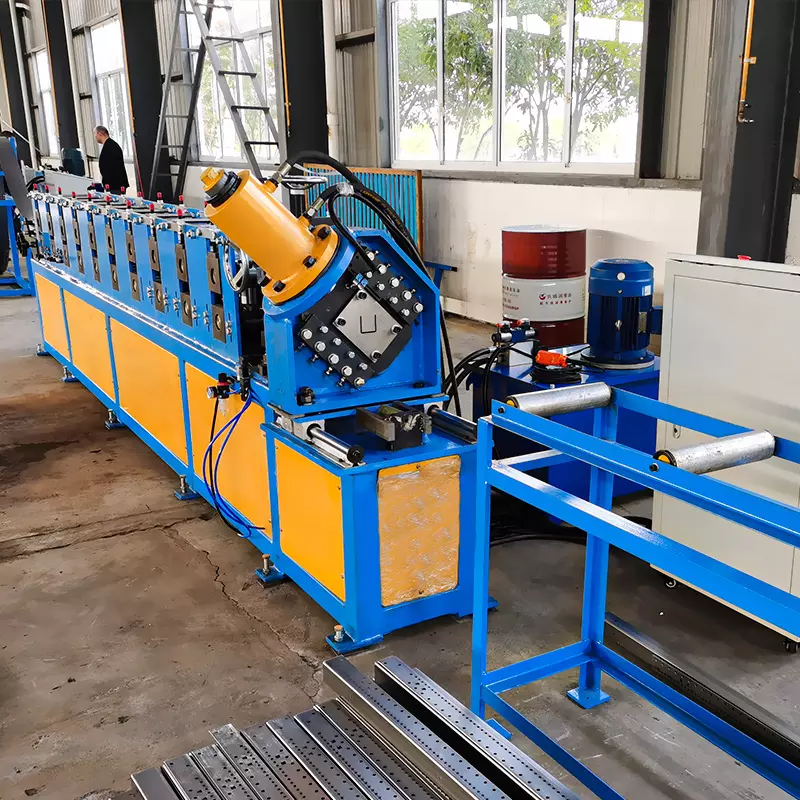
Environmental Contributions of Hospital Bed Frame Roll Forming Machines
Sustainability in manufacturing is no longer optional—it’s a necessity. Hospital Bed Frame Roll Forming Machines contribute to eco-friendly practices in several impactful ways:
1. Reduced Material Waste
- How It Works: Precision rollers and cutting systems ensure maximum material utilization, minimizing scrap.
- Environmental Benefit:
- Conserves natural resources by reducing raw material waste.
- Lowers production costs for manufacturers.
2. Energy-Efficient Operations
- The Innovation: Machines are designed with energy-saving motors and optimized workflows.
- Why It’s Significant:
- Reduces electricity consumption during production.
- Supports manufacturers in achieving sustainability targets.
3. Use of Recyclable Materials
- What It Includes: Machines process materials like aluminum and steel, which are 100% recyclable.
- Environmental Impact:
- Promotes a circular economy by enabling the reuse of materials.
- Reduces dependency on virgin raw materials.
4. Durable, Long-Lasting Components
- What It Ensures: Roll-formed profiles are engineered for strength and longevity, reducing the need for frequent replacements.
- Why It’s Important:
- Extends the lifecycle of hospital bed frames, lowering overall material consumption.
- Aligns with healthcare providers’ goals to reduce waste and improve sustainability.
Real-World Examples of Hospital Bed Frame Roll Forming Machines in Action
The versatility and efficiency of Hospital Bed Frame Roll Forming Machines make them invaluable across various healthcare applications. These real-world examples showcase their impact:
1. National Healthcare Expansion Projects
- Scenario: A government healthcare department launches an initiative to build 50 new hospitals in underserved regions.
- Machine Contribution:
- Produces high volumes of standardized hospital bed frames to equip wards and ICUs.
- Supports tight production schedules with high-speed operations.
- Ensures compliance with local healthcare safety regulations.
2. Emergency Healthcare Facilities
- Scenario: A global humanitarian organization sets up temporary field hospitals during a natural disaster.
- Machine Contribution:
- Crafts lightweight, modular bed frame profiles for quick assembly and transport.
- Ensures durability and stability in challenging environments.
- Supports the rapid deployment of critical healthcare infrastructure.
3. Premium Healthcare Providers
- Scenario: A luxury hospital chain invests in ergonomic and aesthetically pleasing hospital beds for VIP patient rooms.
- Machine Contribution:
- Produces custom profiles with sleek finishes and branding.
- Incorporates advanced features like motorized adjustments and anti-bacterial coatings.
- Enhances patient comfort while maintaining structural integrity.
4. Long-Term Care Facilities
- Scenario: A nursing home network requires adjustable beds for elderly residents.
- Machine Contribution:
- Crafts frames with ergonomic designs to support mobility and comfort.
- Produces profiles that accommodate motorized systems for height and angle adjustments.
- Meets stringent hygiene standards for long-term care environments.
FAQs About Hospital Bed Frame Roll Forming Machines
| Question | Answer |
|---|---|
| Can these machines produce custom profiles? | Yes, modular tooling systems allow for quick adjustments to create tailored profiles for diverse bed designs. |
| What materials can the machine process? | These machines are compatible with galvanized steel, stainless steel, and aluminum alloys. |
| How is hygiene ensured during production? | Machines are optimized to process materials with anti-bacterial and corrosion-resistant finishes. |
| What is the expected lifespan of these machines? | With regular maintenance, these machines can last 15–25 years or more. |
| Can these machines handle high-volume production? | Absolutely! Wuxi Sunway machines are designed for high-speed production, handling up to 30 meters per minute. |
| Does Wuxi Sunway provide global support? | Yes, Wuxi Sunway offers installation, training, and after-sales support worldwide. |
Why Wuxi Sunway Machinery is the Industry Leader
যখন কথা হয় Hospital Bed Frame Roll Forming Machines, Wuxi Sunway Machinery stands out for its unparalleled expertise, innovation, and commitment to quality. Here’s why manufacturers across the globe trust Wuxi Sunway:
- Tailored Solutions: Machines customized to meet the unique needs of healthcare manufacturers.
- Global Reach: A trusted partner in Asia, Europe, the Americas, and beyond.
- Cutting-Edge Technology: Features like IoT integration, AI-driven quality control, and modular tooling.
- Sustainability Leadership: Designs that align with eco-friendly manufacturing practices.
- Comprehensive Support: From installation to troubleshooting, Wuxi Sunway ensures seamless operations.
- Proven Track Record: Decades of experience in roll-forming technology for critical industries.
Conclusion: Building the Future of Healthcare, One Frame at a Time
দ্য Hospital Bed Frame Roll Forming Machine is a cornerstone of modern healthcare manufacturing, enabling the production of durable, hygienic, and customizable bed frames that meet the evolving needs of healthcare providers and patients alike. With advanced technology, sustainable practices, and tailored solutions, these machines empower manufacturers to deliver world-class healthcare equipment.
Ready to transform your production capabilities? Contact Wuxi Sunway Machinery today to explore their state-of-the-art roll-forming solutions. Together, let’s elevate healthcare manufacturing to new heights—one frame at a time!

